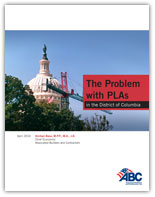DC Council Holds Hearing Tomorrow on Legislation Mandating PLA Schemes
The D.C. Council’s Committee on Housing and Workforce Development and Government Operations is holding a hearing at 10:00 AM tomorrow morning in Room 500 of the John A. Wilson Building on the District Resident Employment and Trade Stimulus Amendment Act of 2010 (Bill 18-650).
This legislation would require contractors building District construction projects costing more than $200,000 that receive government assistance to sign wasteful and discriminatory government-mandated project labor agreements (PLAs).
TheTruthAboutPLAs.com has devoted numerous blog posts documenting problems with this legislation and DC’s poor experiences with PLAs.
Coupled with President Obama’s pro-PLA Executive Order 13502, which encourages federal agencies to funnel federal construction contracts exceeding $25 million to Big Labor, the D.C. bill, if passed, will ensure that union contractors and union members will have a monopoly on almost all public construction in the District of Columbia.
Such political favoritism will have a dramatic impact on the District’s construction industry, where more than 88 percent of the construction workforce does not belong to a labor union. This giveaway to Big Labor won’t help the record unemployment already hurting the D.C. construction industry.
In addition, this legislation will ensure that D.C. taxpayers will pay for four schools, roads and hospitals for the price of five.
A March 31 report on government-mandated PLAs, “The Problem with PLAs in the District of Columbia,” examines existing data indicating whether government-mandated PLAs make sense in the District of Columbia.
Here is a key finding from the report:
“In the context of the current construction economy, government PLA mandates appear likely to have a destabilizing impact on an already depressed industry in the District of Columbia, leading to reduced employment of local residents and considerable harm to small and disadvantaged businesses.”
The study’s compelling economic data allows readers to conclude that PLAs make little sense in the District of Columbia construction market.
Let’s hope that sound policy trumps special interest politics and the D.C. Council kills this bill or makes the appropriate fixes to ensure D.C. construction projects continue to be built using free and open competition.












